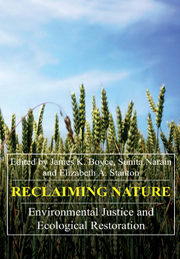Book contents
- Frontmatter
- Contents
- List of Figures and Tables
- Acknowledgements
- Introduction
- Part I ADDING VALUE
- Part II DEMOCRATIZING ACCESS
- Part III CAPTURING BENEFITS
- Part IV DEFENDING THE COMMONS
- 13 International Environmental Justice: Building the Natural Assets of the World's Poor
- 14 Environmental Justice: Reflections from the United States
- 15 Equitable Carbon Revenue Distribution under an International Emissions Trading Regime
- 16 Greenhouse Justice: An Entitlement Framework for Managing the Global Atmospheric Commons
- About the Contributors
- Index
14 - Environmental Justice: Reflections from the United States
from Part IV - DEFENDING THE COMMONS
Published online by Cambridge University Press: 05 March 2012
- Frontmatter
- Contents
- List of Figures and Tables
- Acknowledgements
- Introduction
- Part I ADDING VALUE
- Part II DEMOCRATIZING ACCESS
- Part III CAPTURING BENEFITS
- Part IV DEFENDING THE COMMONS
- 13 International Environmental Justice: Building the Natural Assets of the World's Poor
- 14 Environmental Justice: Reflections from the United States
- 15 Equitable Carbon Revenue Distribution under an International Emissions Trading Regime
- 16 Greenhouse Justice: An Entitlement Framework for Managing the Global Atmospheric Commons
- About the Contributors
- Index
Summary
Introduction
Across the United States, a vibrant social movement for ‘environmental justice’ has emerged. Based initially on the recognition that US minority groups have borne a disproportionate burden of environmental hazards, environmental justice (EJ) advocates have long since shifted from simply resisting ‘environmental racism’ to embracing a positive concept of equal access to environmental and social goods.
The connection between this movement and the asset-building framework has been limited, however, in part because of the nascent nature of the latter, in part because of the immediate preoccupations of the former. Resisting hazards would seem to land one squarely in the usual deficit model: the community is characterized by its lack of clean water, or by the higher risks induced by toxic pollutants in the air. Moving from resistance to the challenge of defining a wealth-building strategy is a useful next step for both the EJ movement and the asset-building framework alike.
In this chapter, I sketch a bridge between the United States environmental justice movement and the asset-building framework. I begin by reviewing the broad political development of the movement and the research on which it has been based. As we will see, there has been some debate over the extent of environmental inequity and this is an issue that even those who are sympathetic to the movement's aims and basic assertions must address in a straightforward fashion.
- Type
- Chapter
- Information
- Reclaiming NatureEnvironmental Justice and Ecological Restoration, pp. 351 - 378Publisher: Anthem PressPrint publication year: 2007
- 6
- Cited by



